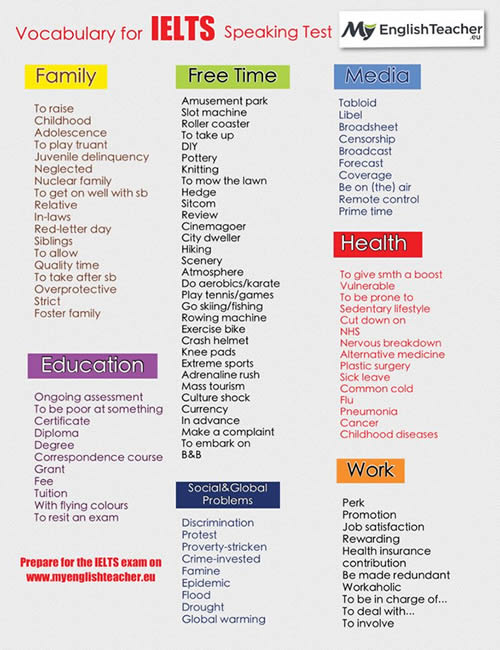
IELTS Vocabulary: Why is it important?
Of all the skills and techniques you need to do well in the IELTS test, vocabulary is definitely one of the most important. IELTS vocabulary preparation can be overwhelming, but this page will help you with everything you need to know before doing your test.
It makes up 25% of your total mark in the Writing and Speaking tests. Not only this but did you know that the Listening and Reading tests are really vocabulary tests too? Take a look at the table below.
The table shows words in the question from an official IELTS reading test on the left and words in the text on the right. It demonstrates how many synonyms are used and therefore, needed to answer the question. All IELTS Reading and Listening tests are like this. In short, if you don’t have a wide-ranging vocabulary you won’t be able to do well on the Listening or Reading tests.
Below we will talk about how you can improve your IELTS vocabulary.

The Wrong Way to Learn IELTS Vocabulary
The worst way to learn new words is to either learn long lists of academic words or to simply read the dictionary. Why? You are not learning the words in context. That means that you are not learning the words within a sentence and paragraph and you will not know how they are supposed to be used properly.
Lots of my students in the past have downloaded long lists of words and thought that they could simply learn them by memorising them. This is the single worst thing you can do to improve your vocabulary. The result was always the same: they would try to use these new words in a sentence and get them completely wrong. IELTS examiners know when you are not using a word correctly and will give you a lower mark if you make lots of mistakes, even if you do use ‘complicated’ words.
The Correct Way to Learn IELTS Vocabulary
The only way that you can learn new words and then use them properly is if you learn them from context, or in other words, from real sources of information, not lists.
Below is a 5 step plan to help you increase your range of vocabulary.
- Pick a book, TV show, radio show, podcast or magazine you are interested in. Don’t pick something boring because you will not stick to the plan and you will easily get distracted. People learn more effectively when they enjoy what they are doing.
- Buy a special notebook. It doesn’t have to be expensive, just something that you can write
in every day. - Read or listen to whatever you have chosen and pick out 15 words you don’t understand. Listen or read and try to guess what they mean from the context. (This step is very important because it will help you remember them.) Note the 15 new words down in your notebook.
- Look up the new words in a dictionary. You can do this online. Beside each word note the meaning, an example sentence or two, collocations, synonyms, antonyms, and pronunciation. You can also draw pictures; whatever will help you remember the word.
- Review the new words after one week, two weeks and then one month. Also, practice using
the new words in a sentence.
If you do this five days a week, after a month you will have nearly 100 new words in your notebook. After 6 months you will have at least 500 new words.
The human mind can only effectively remember around 15 new words in a foreign language per day, so any more and you will not learn them properly and make mistakes. This method is the single most powerful way I know for learning vocabulary and lots of my students have been successful with it.




